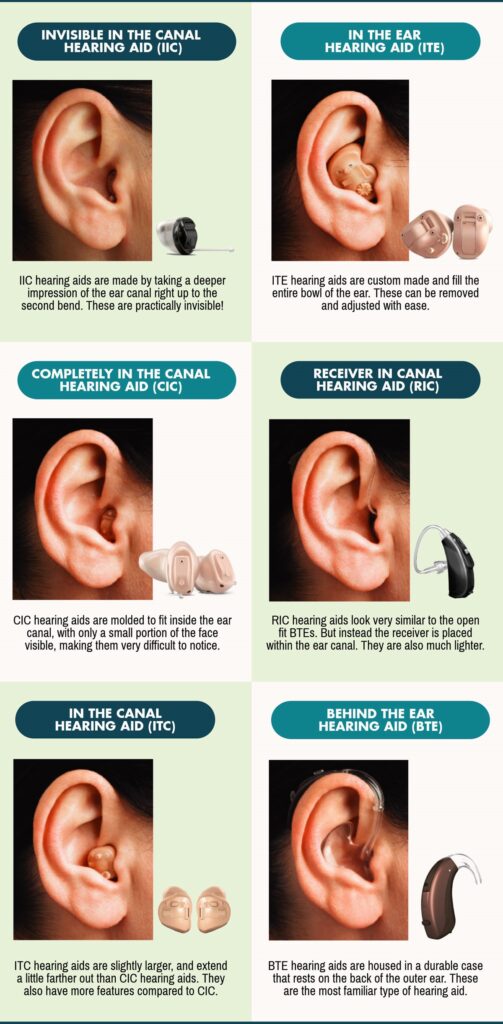Things to know about Hearing Aid

A hearing Aid is a small electronic device that amplify sounds so that people with hearing loss can improve their hearing and speech comprehension. Hearing aids are classified as medical devices, hence, they should be used after consulting an Audiologist.
Types of hearing Aid
Analog Hearing Aids
Analog hearing aids work by increasing the volume of continuous sound waves, amplifying all sounds including speech and background noise. Like a microphone connected to a speaker, they use a continuously varying electrical signal to produce sound.
Advantages of Analog Hearing Aids
- Generally more affordable than digital hearing aids
- Can be more powerful than some digital hearing aids
Disadvantages of Analog Hearing Aids
- Sound filters on analog hearing aids are limited or non-existent, forcing you to hear every sound around you including the ones you don’t want to hear
- Volume on analog hearing aids needs to be carefully adjusted as they can sometimes cause loud screeching sounds
Digital Hearing Aids
Digital hearing aids use a digital signal processor, transforming the electrical signal from sound into digital binary code. Once the signal is digitalized, it can undergo advanced manipulation to adapt precisely to changing environments and your specific hearing abilities. Digital technology makes it possible to tailor and process sounds precisely in ways that are impossible with analog hearing aids.
Advantages of Digital Hearing Aids
- Highly programmable to your specific hearing needs
- Flexible and easily adjustable
- Far better than analog hearing aids
- Many come with extra features such as wireless connection to phones, laptops and other devices
Disadvantages of Digital Hearing Aids
- Generally more expensive than analog hearing aids
- Cheap and poor quality digital hearing aids are often sold online or over the counter by off-brand manufacturers
Special features
- It’s a common misconception that hearing aids simply crank up the volume of the sounds around you. In reality, different types offer specialized features. For example, they may be able to increase certain frequencies that you have trouble hearing.
- Here are some things to consider when choosing a device:
- Background noise filtering. If you work in a noisy environment or regularly engage with other people, you may want a device that filters out background noise.
- Smartphone connectivity. It can be helpful to be able to control your hearing aid remotely with a smartphone app.
- Degree of visibility. Some devices are virtually invisible, while others can be more noticeable.
- Battery rechargeability. If you prefer a waste-free device, you may want hearing aids that use rechargeable batteries rather than single-use batteries.
Styles of Hearing Aids

How long does it take to get used to a hearing aid?
Each person’s experience will be different. Hearing aids can help you hear sounds you have not heard before (or have not heard for many years). Relearning takes place in the central auditory system, and the brain needs some time to sort out any new information entering the ears. You will have a trial period that allows you time to adjust to your hearing aids and evaluate their benefit. Based on your experience, programming changes can be made to help with the adjustment process. Most patients require several weeks of consistent hearing aid use to adjust to their new hearing aids.
“Cheap Hearing Aids” What you should know.
The majority of these cheap “hearing aids” aren’t actually hearing aids. They’re usually PSAPs (personal sound amplification products). PSAPs are not medical devices, and do not properly amplify the higher sound frequencies usually affected by Sensoroneural Hearing Loss —the most common form of hearing loss.
- Not FDA-registered: PSAPs and other cheap hearing aids are not FDA-registered hearing aids. That means they’re not manufactured in accordance with the FDA’s international quality standards for hearing aids, and they don’t meet the FDA’s ANSI requirements for hearing aids.
- Not medical devices: Since PSAPs and other sound amplifiers are not designed to be medical devices, they are not adequate for treating hearing loss.
- Amplify all sounds equally: PSAPs don’t just amplify the sounds you want to hear, but the sounds you don’t want to hear as well. In other words, they don’t target specific frequencies.
- No advanced hearing aid technology: PSAPs and other cheap hearing aids don’t offer the advanced features of modern hearing aids, such as technology to distinguish between background noise and voice frequencies; adaptive listening programs that change with your environment; and many other features.
- Useless in complex listening environments: Because PSAPs amplify all sounds equally, they are all but useless in complex, noisy environments when you’re trying to focus on a conversation—which is exactly when you need them to work the most.
- No feedback control: Cheap hearing aids are more likely to send loud feedback noises to your ears than well-made hearing aids.
- Potentially dangerous: By sending high-pitched noises straight into your ear canal, these devices could potentially damage your hearing even further.
Why do hearing aids cost so much?
- Hearing aids are essentially computers that you wear on your ears.
- Affordable hearing aids are real hearing aids designed to address the specific frequency amplification needs of those with hearing loss.
- Affordable hearing aids, include the noise reduction technology, voice amplification, and performance you would expect from higher-priced models.
- Hearing Aids also offers advanced technologies that prioritize voices and make it easier to hear better in the presence of background noise.
- The technology has been miniaturized and includes helpful features such as rechargeability and Bluetooth connectivity.
- Hearing aids also come with typically a two to three year warranty.

What style of hearing aid I should wear?
Your audiologist can help you make an appropriate choice based on your degree of hearing loss, the shape of your outer ear, the size and shape of the ear canal, your ability to place and adjust the device, any special features you need and any issues with excessive wax or drainage from the ears.
Do hearing aids help tinnitus?
Tinnitus is the medical name for ringing in your ears. Most people who get it also have underlying hearing loss. Hearing aids can help with tinnitus in a few ways:
- By making other sounds louder, they mask or cover the noise of Tinnitus.
- When noise outside your head is louder, your brain gets more auditory stimulation.
- When you can understand others more easily and participate in conversations, you may find your tinnitus less frustrating and socially isolating.
Caring for Your Hearing Aids
Your hearing aids will last much longer if you take good care of them. Some tips to keep in mind:
• Keep them away from heat and moisture.
• Don’t use hair care products, including hair spray, while wearing your hearing aids.
• Clean them as directed. Earwax can damage your hearing aids.
• Turn off your devices when you are not using them.
• Replace dead batteries right away.
• Keep your hearing aids and batteries away from small children and pets. They can be lethal if swallowed.
And finally,
Before you buy Hearing Aid…
- Get a check-up: See you Doctor to rule out correctable causes of hearing loss, such as impacted ear wax, infections, ear drum perforations etc.
- Get appointment with an Audiologist: An audiologist will assess your hearing, ,help you choose the most appropriate hearing aid and adjust the device to meet your needs.
- Plan your budget: The cost of hearing aids varies widely. Professional fees, remote controls, hearing aid accessories and other hearing aid options may cost extra.
After buying Hearing Aid:
- Allow time to get used to the hearing aid.
- Practice using the hearing aid inn different environments=ts.
- Seek support and try to stay positive.
- Go back for a follow up with the Audiologist.
BOOK APPOINTMENT with our Specialists


